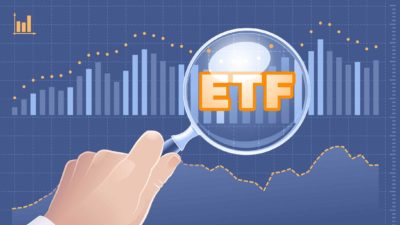All forms of investment involve some level of risk, and ASX shares are no exception. However, ensuring your investments are adequately diversified can considerably reduce your risk exposure.
Diversification can involve spreading your money across different asset types, companies, sectors, or markets. The aim is not to have all your investments eggs in one basket and help protect your wealth during periods of volatility.
But achieving a diversified investment portfolio doesn't mean you need to immediately go on the hunt for a bunch of individual stocks to buy.
One way to add instant diversification to your nest egg is by buying an ASX exchange-traded fund (ETF) or two.
So, if you plan to run the ruler over your portfolio this Easter, and suspect it could use a shake-up, read on!
Because our Foolish writers jumped at the chance to tell us which ASX ETFs they reckon are worth hopping on in April.
7 best ASX ETFs for April 2023 (smallest to largest)
VanEck Video Gaming and Esports ETF (ASX: ESPO), $79.08 million
BetaShares Gold Bullion ETF-Currency Hedged (ASX: QAU), $470.98 million
Betashares Global Cybersecurity ETF (ASX: HACK), $669.96 million
iShares S&P 500 (AUD Hedged) ETF (ASX: IHVV), $1.07 billion
Betashares Nasdaq 100 ETF (ASX: NDQ), $2.85 billion
VanEck MSCI International Quality ETF (ASX: QUAL), $3.36 billion
Vanguard MSCI Index International Shares ETF (ASX: VGS), $5.55 billion
(Market capitalisations as at market close on 5 April 2023)
Why our Foolish writers love these ASX exchange-traded funds
VanEck Video Gaming and Esports ETF
What it does: The VanEck Video Gaming and Esports ETF is a fund that holds a basket of companies all involved in the production and distribution of video games, consoles, and gaming and esports services.
By Sebastian Bowen: Gaming and esports are industries that continue to see massive growth worldwide. And this ETF offers an effective investment for exposure to this trend.
Here in Australia, we don't have too many gaming shares on the ASX. Gaming and esports don't have too much representation in most popular international index funds either. This ETF fills the niche nicely, though.
It exposes investors to well-known gaming names like Nintendo, Activision Blizzard, and NVIDIA, all under one roof.
The VanEck Video Gaming ETF has had a rough year, and remains down by more than 22% from its 2021 highs. But I don't see gaming, esports, and the companies facilitating them going away anytime soon. So it might be a good chance this April to take a second look at this ETF for both its growth potential and diversification qualities.
Motley Fool contributor Sebastian Bowen does not own units of the VanEck Video Gaming and Esports ETF or have positions in any of the stocks mentioned.
BetaShares Gold Bullion ETF-Currency Hedged
What it does: The Betashares Gold Bullion ETF is intended to track the performance of the gold price. This ETF is hedged for currency movements in the exchange rate between the greenback and Aussie dollar.
By Bernd Struben: Economic uncertainty and geopolitical unrest look set to remain over the coming months. These factors have already helped drive gold up 24% from the recent 3 November lows as investors seek haven assets. The BetaShares Gold Bullion ETF is up 19% over that same time.
At US$2,022 per ounce, gold is fast approaching new record highs. I believe that record may be broken in April. Global inflation remains high amid signs central banks are ready to pause their tightening cycles, a good mix for the yellow metal.
This ETF is backed by physical bullion, held in a vault of JP Morgan Chase in London. That means investors can gain exposure to gold price moves without having to buy and safeguard their own bullion. The BetaShares Gold Bullion ETF charges an annual management fee of 0.59%.
Motley Fool contributor Bernd Struben does not own units of the BetaShares Gold Bullion ETF.
Betashares Global Cybersecurity ETF
What it does: This ASX ETF invests in a portfolio of internationally-listed companies that are involved in cybersecurity. There are currently 35 companies in the portfolio, 83% of which are US-listed, though they generate earnings from around the world.
By Tristan Harrison: This ASX ETF has fallen by more than 20% since November 2022, making it great value buying right now.
I believe businesses and governments will continue to pay for cybersecurity services, even during economic downturns, so I think the underlying businesses held by this ETF are quite defensive.
And, sadly, I think demand for cybersecurity is likely to increase over the long term as more services are carried out online and the instance of cybercrime continues growing.
The Australian Cyber Security Centre (ACSC) 2022 report said that the number of cybercrime reports had increased 13% year over year, while the average cost per cybercrime incident increased by 14%. If this trend continues, then cybersecurity company earnings could keep rising and, thus, so could this ETF's unit price.
Motley Fool contributor Tristan Harrison does not own units of the Betashares Global Cybersecurity ETF.
iShares S&P 500 (AUD Hedged) ETF
What it does: This ETF tracks the performance of the S&P 500 Index (SP: .INX) in the United States.
By Bronwyn Allen: Warren Buffett is the world's most successful investor. He's generated a $100 billion fortune over his lifetime. He researches and invests in companies for a living, yet he admits a lot of his wealth has resulted from just a few really good investment decisions along the way.
One piece of advice Buffett often gives to investors who lack the necessary skills or experience to pick individual stocks is to simply buy the index. Specifically, the S&P 500 Index, which tracks the performance of the 500 largest listed companies in the US by market capitalisation.
Conveniently, you can invest in the S&P 500 via ASX ETFs, one of them being the iShares S&P 500 (AUD Hedged) ETF. Since its inception in 2014, this ETF has delivered average annual returns, including distributions, of 9.46%. That sort of growth over a 40 or 50-year investment horizon has the potential to secure you a great retirement. Furthermore, the ETF charges a small management fee of just 0.1%.
Motley Fool contributor Bronwyn Allen does not own units of the iShares S&P 500 (AUD Hedged) ETF.
Betashares Nasdaq 100 ETF
What it does: This ETF seeks to closely mirror the performance of the 100 largest companies in the NASDAQ-100 (NASDAQ: NDX), excluding financials. The newer United States exchange houses many of the biggest and most profitable businesses of today, skewing heavily toward tech companies.
By Mitchell Lawler: Many investors are still anxiously watching the economy to see whether central banks will be able to coordinate a soft landing, or if we'll experience a recession.
Despite this, I believe there is no greater time to invest than when most people are concerning themselves with the next several months, rather than several years. An ETF, such as the Betashares Nasdaq 100 ETF, offers a low-cost way of dollar-cost averaging through uncertain times.
The reason I personally favour this ETF is its composition of extremely profitable companies. All top 10 holdings, aside from Amazon at the moment, are raking in billions of dollars in profits at 10% to 35% margins.
Even in a tumultuous time, I'd argue these tech titans are some of the most antifragile companies on offer globally.
Motley Fool contributor Mitchell Lawler does not own units of the Betashares Nasdaq 100 ETF or shares in Amazon.com, Inc.
VanEck MSCI International Quality ETF
What it does: This ETF gives investors exposure to a group of high-quality shares from across the world (excluding Australia).
By James Mickleboro: I think the VanEck MSCI International Quality ETF could be a top option for investors in April.
In the current uncertain economic environment, I believe that a focus on quality could deliver results for investors. And this rules-based ETF has bucketloads of quality.
That's because, to be included in the fund, a company must have low leverage, high earnings growth rates, and high returns on equity.
Among its almost 300 holdings are companies such as Apple, Ferrari, Microsoft, Nestle, Nike, and Visa.
Motley Fool contributor James Mickleboro does not own units of the VanEck MSCI International Quality ETF or have positions in any of the stocks mentioned.
Vanguard MSCI Index International Shares ETF
What it does: The Vanguard MSCI Index International Shares ETF aims to track the MSCI World ex-Australia Index, which covers around 85% of the free float-adjusted market capitalisation of 22 developed markets.
By Brooke Cooper: One of the major upsides to investing in ETFs is, in my opinion, instant diversification.
There are hundreds of ways one can diversify their portfolio – investing in various companies, sectors, or even entirely different markets.
Those specifically interested in geographic diversification might like to take a closer look at the Vanguard MSCI Index International Shares ETF.
It holds 1,473 stocks – 69% of which are listed in the US, demands a 0.18% per annum management fee, and has gained nearly 97% since its inception in 2014.
Some of its top holdings include Apple, Microsoft, and Amazon.
Motley Fool contributor Brooke Cooper does not own units of the Vanguard MSCI Index International Shares ETF or have positions in any of the stocks mentioned.









